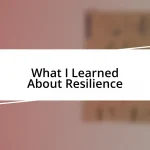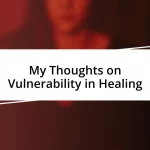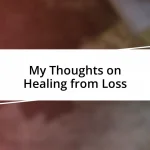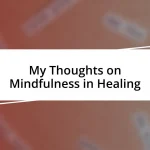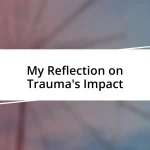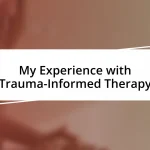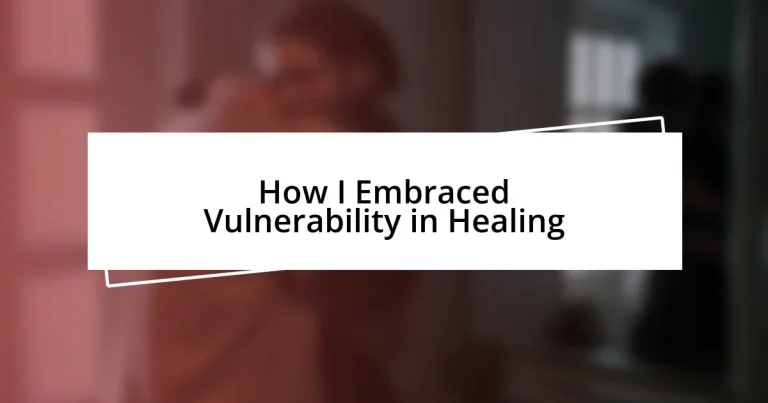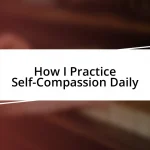Key takeaways:
- Embracing vulnerability opens the door to meaningful connections and shared healing experiences.
- Journaling and honest conversations foster emotional articulation and trust within support systems.
- Overcoming the fear of vulnerability can lead to genuine understanding, empathy, and personal growth.
- Reflecting on vulnerable moments allows individuals to recognize their strength and inspires others to share their struggles.
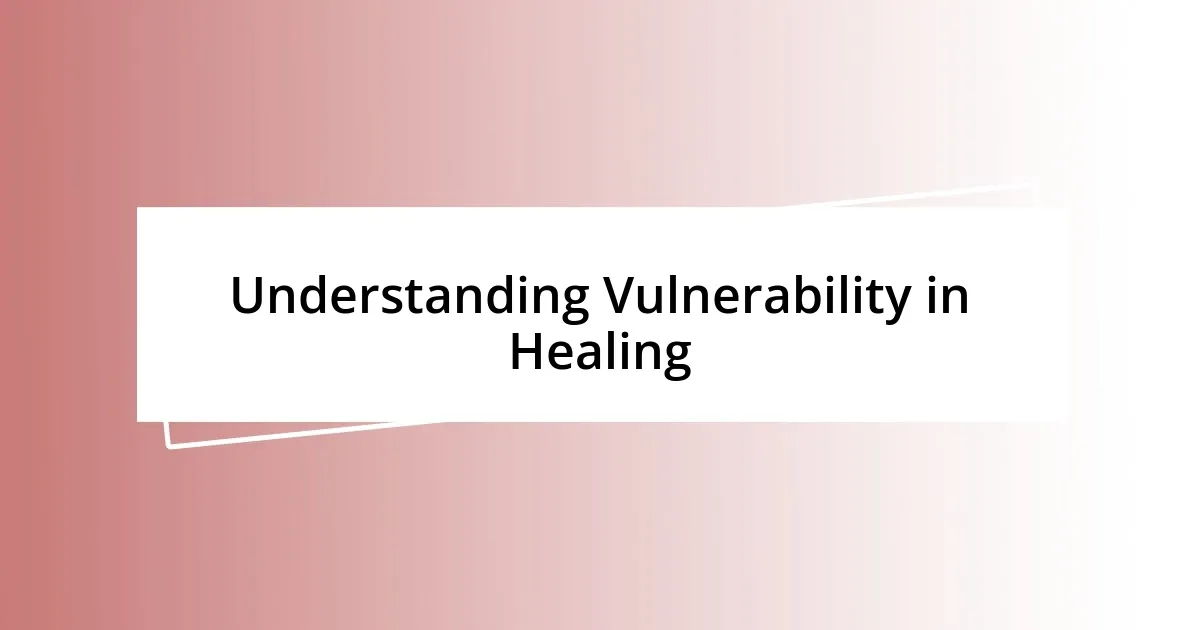
Understanding Vulnerability in Healing
Vulnerability, for me, was a daunting word. It seemed synonymous with weakness until I experienced a turning point during a group therapy session. When I shared my fears, the weight I felt lifted as I realized that my honesty opened the door for others to share their struggles too. Isn’t it fascinating how our shared scars can be sources of strength?
As I journeyed deeper into healing, I discovered that embracing vulnerability allows us to connect with our true selves and others. I remember feeling terrified before divulging my childhood trauma to a close friend. But in that moment of honesty, I felt the warmth of acceptance wash over me. How often do we miss out on meaningful connections because we hide behind walls?
I’ve learned that vulnerability isn’t just about sharing wounds; it’s also about owning our story. When I started to express my emotions honestly, I found resilience within. It made me wonder—what if we all dared to be open about our experiences? What healing could arise from that bravery?
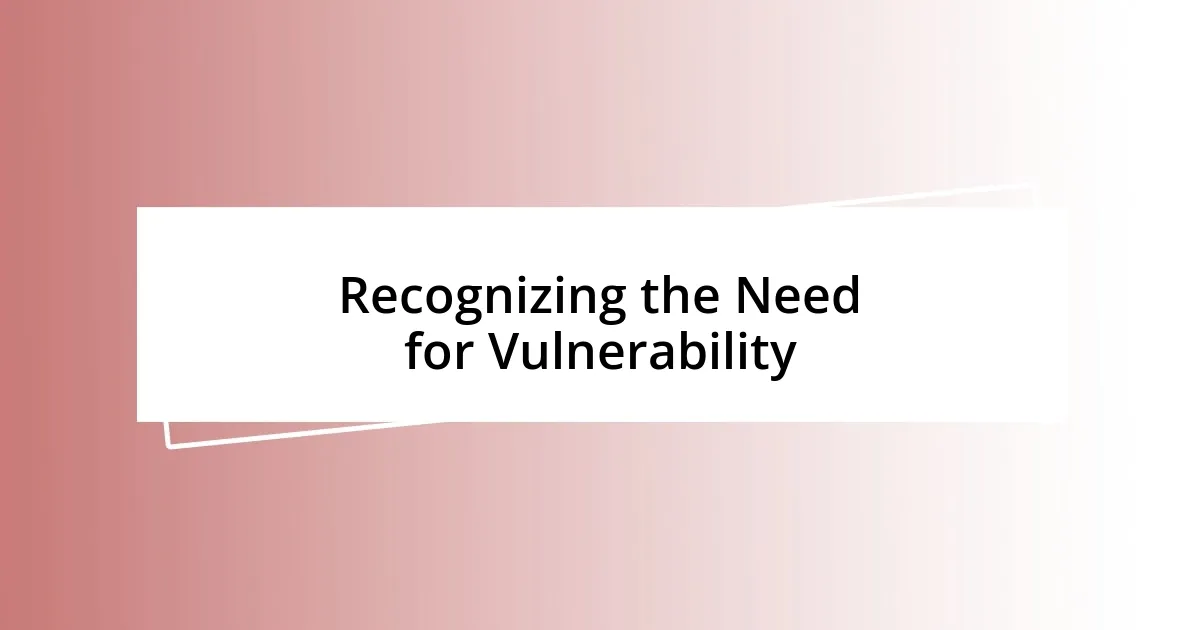
Recognizing the Need for Vulnerability
Recognizing the need for vulnerability was a gradual awakening for me. I remember vividly the day I realized that shielding myself from pain only led to deeper isolation. It was during a quiet moment at home, when I felt an overwhelming sense of loneliness, that I understood my emotional walls were keeping both love and healing at bay. Has anyone else felt that tug of longing while hiding away?
Through journaling, I began to articulate feelings I had buried for years. One night, as I penned down my thoughts, I was struck by a profound truth: vulnerability isn’t a weakness; it’s the gateway to authenticity. I recall sharing a passage from that journal with my partner, and to my surprise, it ignited a heartfelt conversation that drew us closer. It’s remarkable how such moments can illuminate the path towards healing, don’t you think?
The realization that embracing vulnerability could be a catalyst for growth was indeed life-changing. Early on in my journey, I often felt reluctance to let my guard down. However, I discovered that genuine connections blossom in the soil of shared truths. It’s almost magical to think that by simply being open, we allow others to feel safe to do the same. In my experience, those moments have been the cornerstone of my healing.
| Recognizing Vulnerability | Impact on Healing |
|---|---|
| Isolation | Deepened connections |
| Fear of judgment | Acceptance and support |
| Guarded emotions | Authentic expression |
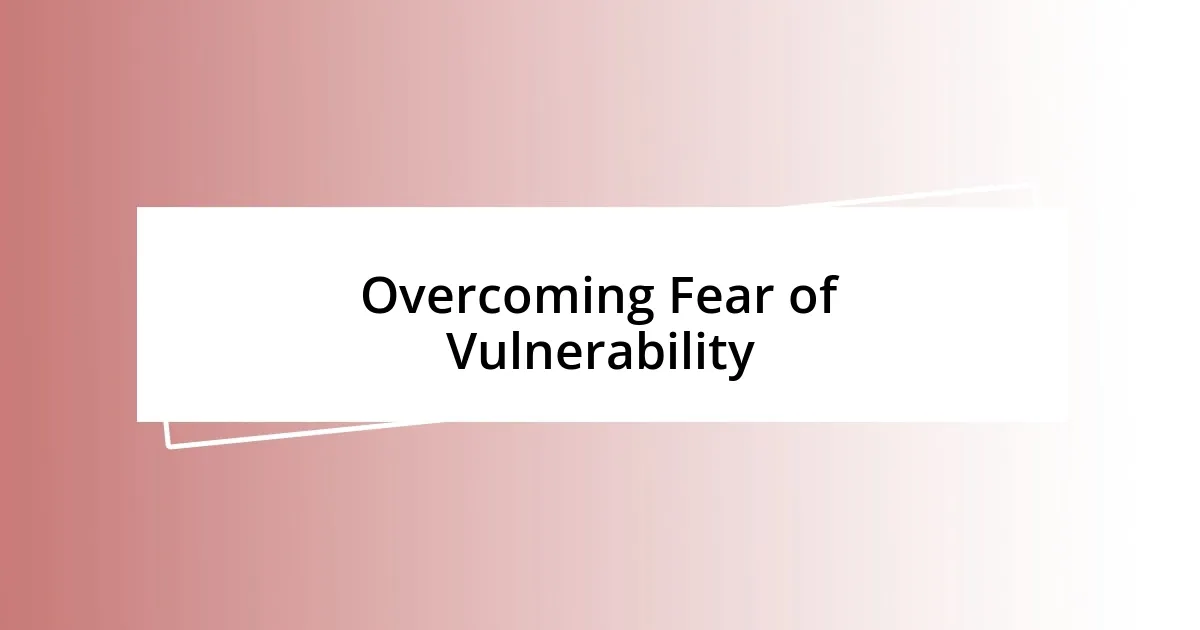
Overcoming Fear of Vulnerability
Overcoming the fear of vulnerability was one of the toughest battles I faced on my healing journey. I vividly remember a particular moment at a friend’s gathering when I held back from sharing my thoughts about my experiences, terrified of what others might think. In hindsight, I realize that my imagination conjured worst-case scenarios, while the truth was that those around me valued authenticity. By taking small steps—like sharing funny yet personal stories—I gradually felt my fears start to dissolve.
- Acknowledging the Fear: I often wrote down what scared me most about being vulnerable, which helped me confront those emotions head-on.
- Building Trust: I started to open up with a close friend first, which created a safe space for both of us to share deeper thoughts.
- Celebrating Small Wins: Each time I shared something personal and felt received with kindness, it reinforced that vulnerability could lead to connection rather than judgment.
It was during a particularly challenging week at work when I faced down my fear of vulnerability in a new way. I decided to express my exhaustion and struggles to my manager instead of pretending everything was fine. To my relief, their support was immediate and genuine. I felt a sense of liberation—I wasn’t alone in my feelings of overwhelm. It dawned on me then that vulnerability could foster understanding and empathy, both for myself and for others.
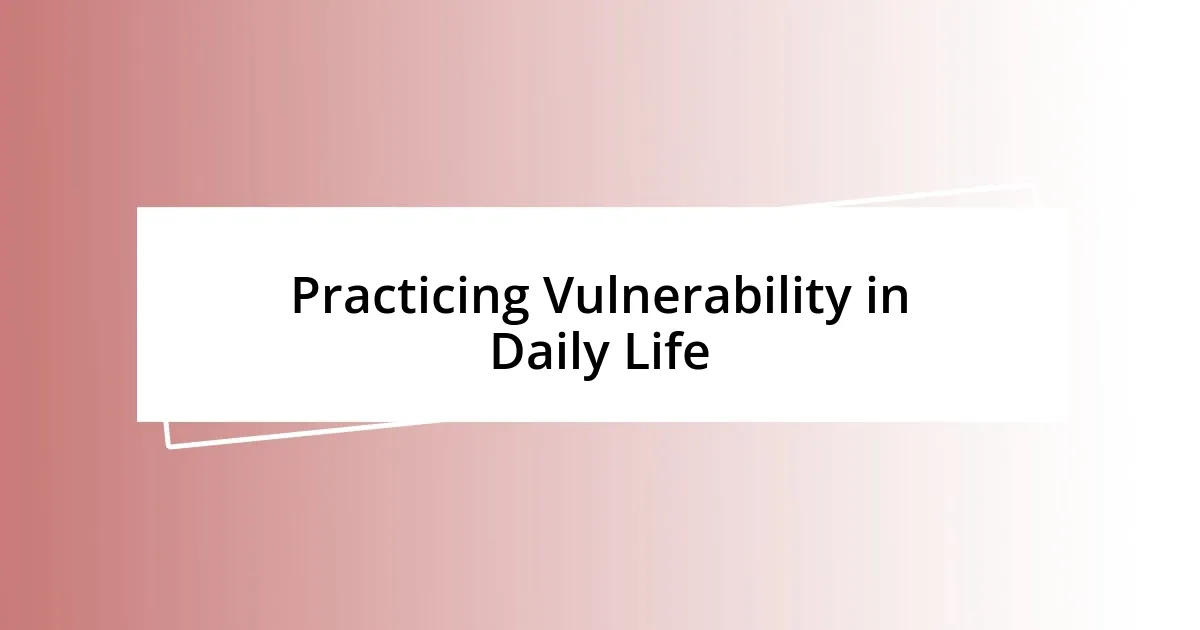
Practicing Vulnerability in Daily Life
Practicing vulnerability in daily life can be like stepping onto a tightrope. I remember the first time I openly expressed my struggle with anxiety to my colleagues. Instead of fear or judgment, I was met with understanding and shared stories of their own experiences. Isn’t it fascinating how a simple act of honesty can shift the atmosphere from apprehension to solidarity?
One of my favorite practices is to engage in honest conversations with friends over coffee. I’ll often start by sharing a small fear or insecurity, and it never ceases to amaze me how it invites the same openness in return. I once mentioned how I felt unqualified in a new role, and my friend responded with her own similar feelings of self-doubt, creating a moment that felt both real and reassuring. These little exchanges remind me that vulnerability can transform our relationships, turning casual connections into meaningful bonds.
I’ve also learned to embrace vulnerability during everyday activities, like attending fitness classes. Initially, I hesitated to share that I was a beginner. But when I finally admitted my inexperience, I found encouragement not just from the instructor but also from fellow participants. It’s incredible to think that by allowing ourselves to be seen, we create an environment where others feel empowered to do the same. Have you ever noticed how vulnerability can weave together a tapestry of support and camaraderie? It’s a powerful catalyst for connection.
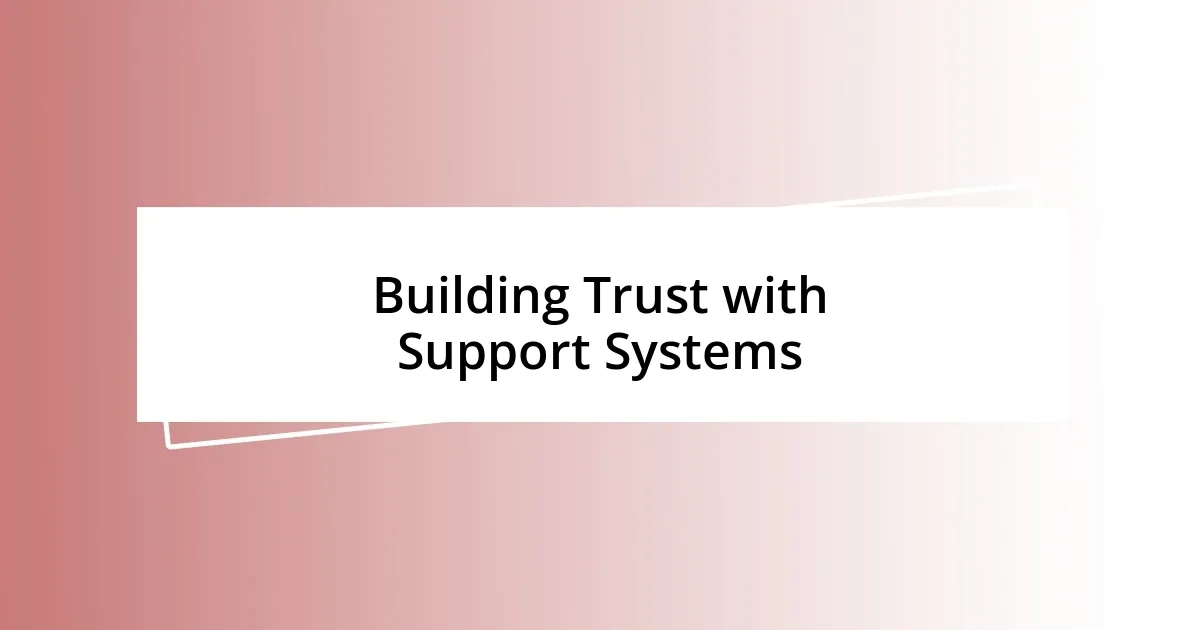
Building Trust with Support Systems
Building trust with support systems often begins with the simple act of sharing our truth. I recall a time when I sought support from my siblings during a difficult phase. I hesitated at first, worried they might dismiss my feelings, but as I laid bare my struggles, their responses were overwhelming. They not only listened but opened up about their own challenges, reinforcing the idea that vulnerability can pave the way for deeper connections.
In my experience, trust is nurtured through consistent, honest communication. For example, I started scheduling weekly check-ins with a close friend where we could candidly discuss our highs and lows. It was a game-changer in our friendship. The more we shared our vulnerabilities, the more I felt that safety net underneath me, reminding me that I could always lean on her, and she on me. Have you ever wondered why such openness makes us feel so secure? It’s because knowledge of each other’s struggles creates a shared understanding, allowing trust to grow organically.
Moreover, I’ve learned that celebrating each other’s journeys can significantly enhance trust within a support system. Once, after a friend shared a vulnerable moment from their past, I organized a small gathering to honor everyone’s growth and resilience. Reflecting on those experiences sparked joy and appreciation among us, and it solidified our bonds. Doesn’t it strike you as profound how acknowledging our growth can further strengthen the fabric of our relationships? It’s these moments of recognition that foster an unwavering trust, turning our support systems into a sanctuary.
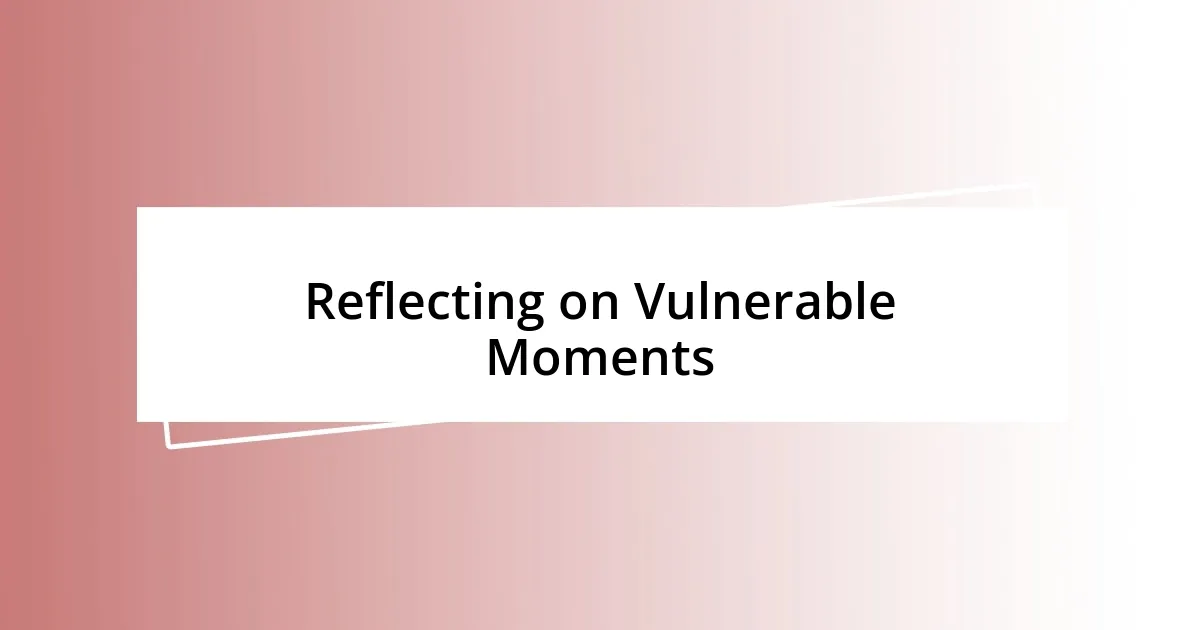
Reflecting on Vulnerable Moments
Reflecting on vulnerable moments often reveals layers of strength we didn’t know we had. I still remember a particularly challenging evening when I sat alone, grappling with feelings of inadequacy after a failed project. As I let myself cry, I realized that confronting those raw emotions was a pivotal turning point for me. Isn’t it interesting how such discomfort can illuminate our paths to healing?
There are times when I find myself revisiting moments where I chose to be open about my struggles. For instance, during a family gathering, I shared my insecurities about career choices. I half-expected a wave of silence, but instead, I was embraced with stories of similar doubts from my relatives. Did you ever think that being vulnerable could create such a ripple effect? This experience taught me that our shared vulnerabilities can knit together a fabric of empathy, making us all feel less alone.
Looking back, I recognize that those fleeting moments of vulnerability often carry lasting lessons. I sometimes reflect on a time when I confided in a mentor about my fears of not being taken seriously in my profession. His validating response not only reassured me but encouraged me to advocate for myself more confidently. It’s remarkable how a single moment of honesty can fuel personal growth. Have you ever had a moment like that, where vulnerability transformed not just a conversation, but your entire outlook?
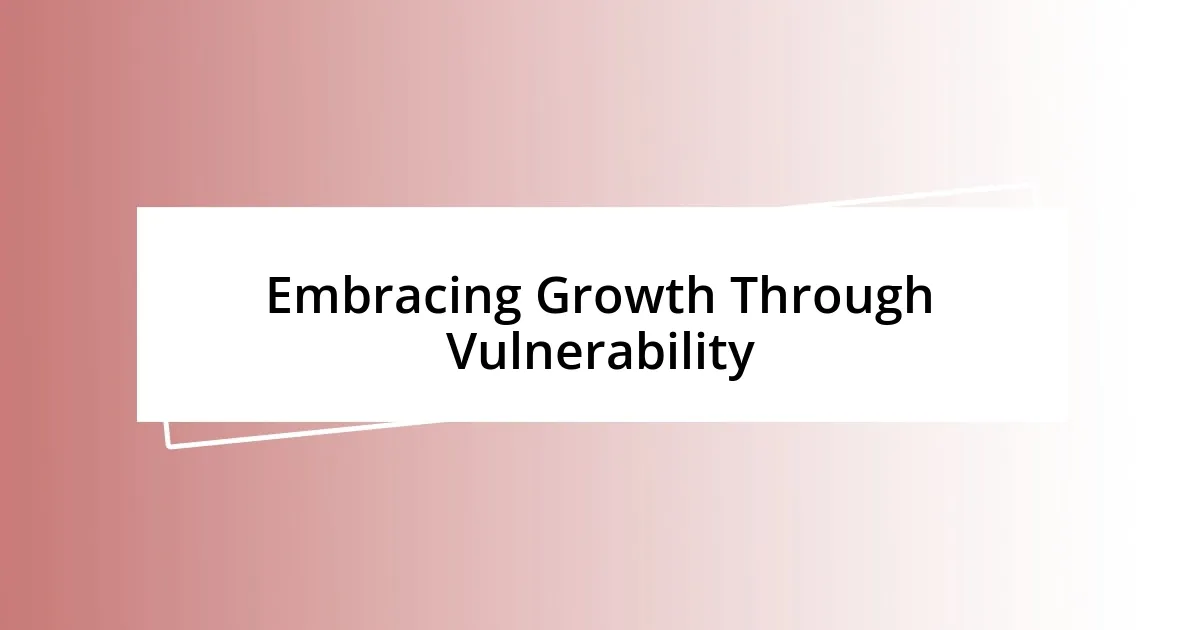
Embracing Growth Through Vulnerability
Embracing vulnerability can be a powerful catalyst for personal growth. I remember standing in front of a room full of colleagues during a team meeting, sharing my struggles with self-doubt. Rather than cringing under their gaze, I felt an unexpected sense of release, as though peeling back layers of armor allowed me to breathe freely. Have you ever noticed how revealing our imperfections can create space for connection and support?
As I continued to embrace vulnerability, I found that it often led me to confront fears head-on. I attended a workshop on emotional expression and, on a whim, volunteered to share a personal story that weighed heavily on my heart. To my surprise, the moment I spoke my truth, I could feel the walls I’d built begin to crumble. Did you know that such authenticity can inspire others to do the same? That experience reminded me that when we dare to be vulnerable, we not only embark on our own journey of growth but also invite others to join us.
Looking back, I’ve realized that my willingness to be open about my challenges has transformed the way I view setbacks. After navigating a turbulent period in my life, I started journaling my thoughts and feelings. At first, it was daunting, but putting pen to paper became a source of healing. The act of articulating my struggles shifted my perspective from being a victim of circumstances to embracing my role as an active participant in my own story. Can you relate to finding strength in the act of simply being honest with oneself? It’s through vulnerability that I began to see growth not as a destination, but as a continuous journey filled with rich lessons and insights.
